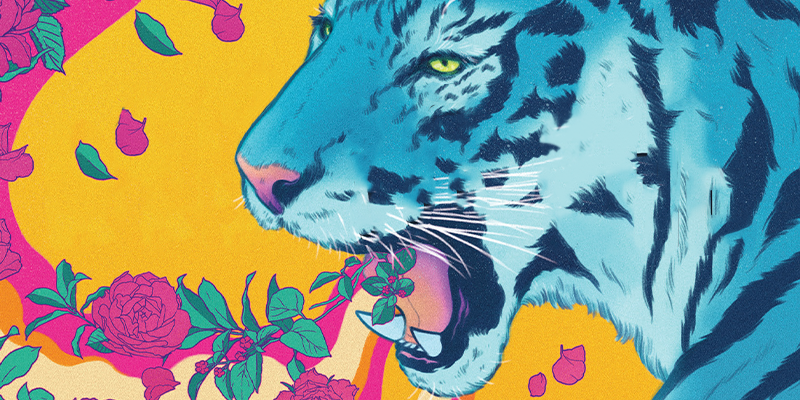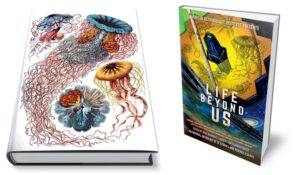Favorite SFF Short Story Collections of 2023
One of the best holiday traditions I’ve ever heard of is Jolabokaflod, the Icelandic practice of flooding those we love with great books on Christmas Eve. In the spirit of this holiday (and any others you may celebrate) here’s five short story collections I loved reading this year.
Some of these are newly published in 2023, and some were just new to me. Also, if you prefer to give or receive novels instead of short fiction, you can read this post about my favorite speculative novels of 2023.
5) What We Feed the Manticore by Talia Lakshmi Kolluri
Since I was a young girl, I’ve wished I could talk to animals. This short story collection brought me one step closer, as each story is written from the perspective of a different animal from a different part of the globe.
Contrary to the stereotype that talking animals are “just for kids,” the collection uses these uncommon narrators to take on hefty topics such as climate change, war and animal poaching, challenging readers to open their hearts and minds to new ways of experiencing the world.
My favorite story was “The Good Donkey,” in which a donkey struggles to find peace in a violence-torn zoo in Gaza City. It broke my heart. Although the story was written before the ongoing war, it’s a sadly relevant tale that examines love, loyalty, and the struggle to simply stay alive in this battered region.
4) Life Beyond Us, edited by Julie Nováková, Lucas K. Law and Susan Forest
This short story anthology by the European Astrobiology Institute is billed as hard sci fi, complete with non-fiction essays that elaborate on each story’s imaged form of alien life. Nevertheless, the collection’s strength lies in its twenty-seven works of fiction–and the imagination, originality and heart therein.
Among my favorites:
- Alien life as singing space whales (“The Lament of Kivu Lacus” by B. Zelkovich);
- Cannibal hive queens (“Heavy Lies” by Rich Larson);
- Talking plasma clouds (“The Diaphanous” by Gregory Benford);
- Crystal poets (“Lumenfabulator” by Liu Yang and translated by Ladon Gao); and
- A human so adept at alien communication he may no longer be human (“Defective” by Peter Watts.)
3) 2022 Best American Science Fiction and Fantasy, edited by Rebecca Roanhorse
This annual anthology series has become a go-to for me each year because I know it will always feature a high-quality, varied collection of stories that keep me abreast of some of the newest and brightest ideas and authors in SFF. In this year’s installment, my favorites were:
- “Proof by Induction” by Jose Pablo Iriate, about a mathematician who visits a simulacrum of his dead father in hopes of solving a theorem that could save his foundering career;
- “Colors of the Immortal Palette” by Caroline M. Yoachim, about a talented painter who wants her mysterious, immortal teacher to “turn” her so she has more time to pursue her art—examining sexism, ambition, love and the protagonist’s mixed French-Japanese ancestry.
- “L’Espirit de L’Escalier” by Catherynne M. Valente, about a self-absorbed god who tries to bring his wife back from the dead; and
- “Root Rot” by Fargo Tbakhi, a devastating portrait of a Palestinian alcoholic living in the Mars settlement of New Tel Aviv.
2) Disabled People Destroy Science Fiction, Uncanny, Issue 24
I try to write diverse fiction, but this year I made the uncomfortable realization that I’d never written a short story with a disabled person in it. To remedy this, my first step was to read more fiction with disabled characters–particularly fiction written by authors with firsthand experience and insight into the challenges and problematic tropes disabled people face. And that, in turn, reminded me of this issue of Uncanny, which I’d already heard was fantastic.
After devouring it in a few short days, I can attest that Disabled People Destroy Science Fiction lives up to the hype. It includes not only short stories, but poetry and thought-provoking non-fiction essays on common mistakes, pet-peeves, and downright insults many disabled people identify when they are depicted in (or excluded from) fiction.
Among my favorite stories:
- “House on the Moon,” by William Alexander, about a school field trip to a strange castle on the moon, as seen through the eyes of a disabled girl nearly killed in a recent eugenics war;
- “Birthday Girl,” by Rachel Swirsky, about a bipolar woman coming to terms with child trauma and family drama while watching her young bipolar niece get the love and support she was denied.
- “The Things I Miss the Most” by Nisi Shawl, about a young woman who falls in love with the “oppositional persona” created by an experimental brain surgery meant to stop her seizures.
- “The Stars Above” by Katharine Duckett, a story about a nomadic village of humans struggling to hide and survive in Kazakstan after an alien invasion.
1) Free short fiction stories by Rich Larson
This last recommendation may work better as a “gift” to yourself than someone else because it’s actually a list of FREE short fiction available online by the epically talented writer Rich Larson.
I discovered this list of Larson’s 70-plus short stories just before falling sick recently, and as I worked my way through them while recovering (and beyond), I was stunned by their originality and quality.
Larson’s fiction is generally classified as cyberpunk, with a focus on people and their fall into –or struggle out of — darkness. Among my favorites:
- “You Are Born Exploding,” about a mother who faces a terrible decision as the world fights a virus that turns people into sea monsters;
- “Jonas and the Fox,” about a disillusioned revolutionary’s last chance to escape capture after uploading into a little boy’s body;
- “Carnivores,” about a Neanderthal clone trying pull off a big heist that goes wrong in most stomach-churning way; and
- “Let’s Take This Viral,” a story set so far in the future that bored immortals reinvent the plague to find excitement and meaning in life.
In fact, after reading so much free fantastic prose, I felt very guilty that Larson hadn’t earned a dime from me. Honestly, if a genius like him can’t earn a living writing short fiction, I’m not sure who can.
My solution was to search for anything he had written that I could buy and pay it forward. He has two YA novels, but his short story collection Tomorrow Factory seemed more my speed, so that’s what I bought. It just arrived in the mail two days ago, and I’m so excited to put it on my TBR list for the new year.


